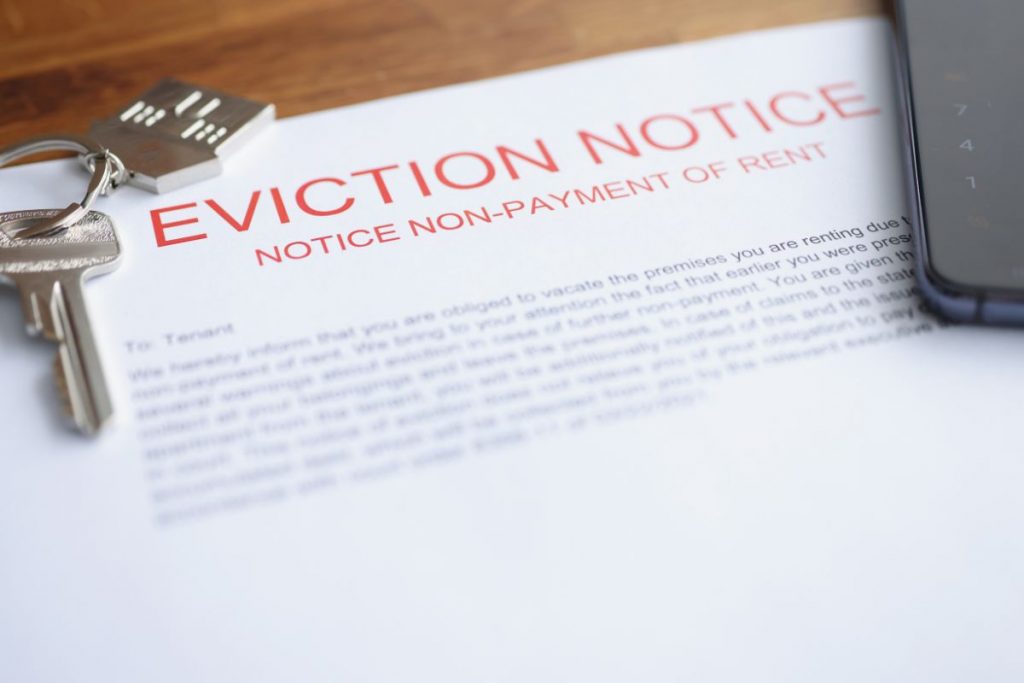For many people, renting a home is now standard practice. People choose rental apartments because of its flexibility and lifestyle. However, the Real Estate Regulatory Agency (RERA) in Dubai has established particular legislation and a code of conduct for tenants and landlords.
With rising rental prices, landlords are taking advantage by demanding higher rents or eviction. However, Law No. (26) of 2007, as modified by Law No. (33) of 2008, specifies some particular situations of landlords issuing eviction notices prior to the expiration of the contract.
Let’s go over these eviction notice cases in Dubai in detail; understanding them will assist tenants and landlords avoid facing penalties from the Tribunal.
EVICTION NOTICE UNDER RERA TENANCY LAW
Rental rates have risen since the outbreak. Speaking of which, homeowners are taking advantage of this profitable time by increasing the rent or evicting the current tenant in order to sign a contract with a new one. To get a sense of market offering in Dubai, use services like the RERA rent calculator or the DLD’s property lease evaluation services.
After determining the lease rates for their property, landlords try to increase the rent for a higher profit. As a result, in order to be informed of their rights and duties as tenants, one must learn and comprehend the RERA tenancy law in Dubai.
According to Dubai tenant eviction legislation, landlords may issue a tenancy eviction notice before the contract expires under the following situations.
FAILURE TO PAY RENT

If the tenant fails to pay the required rent within 30 days after receiving notice from the landlord, the homeowner has the right to evict their tenant. The tenant’s failure to pay rent on time will result in this tenancy eviction notice in Dubai.
MISSUSE OF PROPERTY
When renting an apartment in Dubai, tenants must follow the rules and provisions of a tenancy contract If they utilize the property for reasons that violate the laws, regulations, and ethical behavior, the landlord may issue an eviction notice to the renter.
Tenants who fail to meet any responsibilities imposed by RERA rules and tenancy agreements may have their lease contract terminated. Furthermore, landlords in Dubai will deliver eviction notices within 30 days.
SUB-LEASING THE PROPERTY
Another situation in which a landlord might serve an eviction notice on a tenant in Dubai is when the lessee sublets the property without permission. The subtenant will be evicted from the property by the landlord. In addition, the sub-tenant has the right to recompense from the tenant.
DAMAGE TO THE RENTAL PROPERTY

Tenants who cause damage to real estate property or risk the property’s safety may receive a tenancy eviction notice in Dubai. Furthermore, if tenants make changes to the property without first obtaining permission from the landlord and real estate authorities, they may face harsh penalties.
The landlord can give the Dubai Municipality-attested technical report alongside a notice to the tenants asking them to vacate the property within thirty days.
EVICTION NOTICE AFTER THE END OF THE TENANCY CONTRACT
Landlords in Dubai cannot send tenant eviction notices after the tenancy contract expires unless the following requirements are met.
PROPERTY DEMOLITION OR RENOVATION
Landlords in Dubai can issue a tenancy eviction notice if a government agency orders property destruction or reconstructing for the Emirate’s growth. Furthermore, when the lease term expires, the landlord may request property eviction if the property requires significant renovation or maintenance that cannot be undertaken while the tenants are there.
When a property has to be changed, the landlord submits a technical report from Dubai Municipality. Furthermore, landlords may issue eviction notices after obtaining clearance to destroy the property for reconstruction.
FOR THE USE OF LANDLORDS
If tenants in Dubai want to utilize the property for themselves or first-degree relatives, landlords can file an eviction notice on them. After requesting possession for personal use, landlords will be unable to rent the property for a year.
When a landlord requests eviction after the lease contract has ended, the tenants must be notified ninety days before the agreement ends.
The law mentioned above deals specifically with Dubai’s eviction notice laws. A positive connection between the tenant and landlord is required for both sides to benefit from the arrangement. In addition, all parties must follow the terms of the signed and registered agreement in Ejari.




